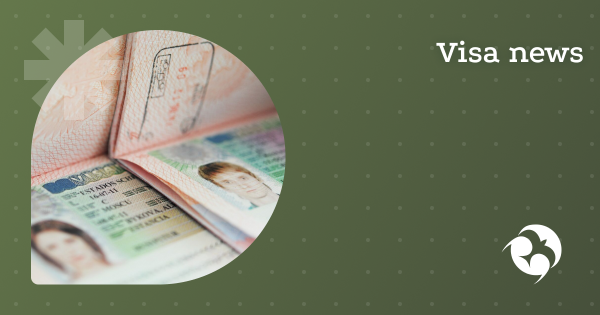The Baltic country is one of the most progressive in Europe in terms of digitalization. Estonia was the first to adapt to the changing work culture and introduced e-residency in 2014.
In mid-2020, the government opened the Digital Nomad Visa program for remote specialists who are not tied to one location. The government issues short-term and long-term C and D visas for foreigners for a period of 6 and 12 months. The government allows to work under employment contracts with companies registered abroad, conduct business in another country, engage in freelancing.
Specifics of the Estonian freelance visa
At the beginning of 2024, the country ranked 20th in the World Digital Nomad Index with a score of 3.01. From 2020-2024, the government issued a total of 535 visas for nomads.

- We will answer all your questions
- We will help you choose the best option
- We will guide you through every step or do everything for you
An Estonian nomad visa is the equivalent of an annual residence permit. People from technological and creative professions apply for it. Among them are representatives of IT professions: software developers, graphic designers, social network managers. Specialists of other professions working outside of freelance offices can participate in the program.
E-residency simplifies the lives of entrepreneurs. This certificate with a special chip allows its holder to manage shares and develop his/her business remotely. With its help, individual entrepreneurs solve administrative and financial issues without wasting time on verifying payments, as well as sign contracts. There are no limits on the issuance of DNV visas, and it can be obtained by adult self-employed and freelancers with certain incomes.
The main conditions in 2025:
- use of telecommunication technologies in activities;
- confirmation of qualification requirements;
- contract with a foreign company;
- provision of freelance/ consulting services under foreign contracts;
- income from 3,500 euros.
What taxes do freelancers pay?
Individuals who have lived in the territory for more than 183 days are recognized as tax residents. Expats undergo electronic registration and receive a digital ID-kaardiga. Income tax (tulumaks) is calculated at a rate of 20%. Part of the non-taxable income depends on the annual profit.
When earning up to €14,400, the non-taxable part is €7,849. Income of €25,200 is exempt from tax of €10,800. For individual entrepreneurs, expenses related to work activities are additionally deducted from the taxable amount. Social tax (sotsiaalmaks) is paid by entrepreneurs in the country of work at a rate of 33% of income.
Tax table for digital nomads, freelancers, self-employed and sole proprietors
| Tax name | The amount of tax | Note |
| Income tax (residents) | 20% | Applies to global income with tax resident status |
| Income tax (non-residents) | 0% | Income from foreign sources is not taxed if the employee is not a resident |
| Social tax | 33% | Mandatory for residents and employers. Includes pension and medical contributions |
| VAT | 22% | Applies to goods/services sold in Estonia. For export – 0% |
| Tax on dividends | 20% (20/80 of the total) | Is charged when distributing the company’s profits. For sole proprietors and LLC |
| Minimum social contribution | 820 €/month (gross) | Minimum wage for residents starting in 2024 |
How much does the visa cost?
The price of registration for self-employed and freelancers depends on the category. DNV type costs €80, category €100. The state fee is allowed to be paid in cash at the consulate. Children under 6 and students are exempt from the duty.
Necessary documents
Before receiving the visa, the applicant needs to fill out an application, collect a package of documents and present with the package of documents at the interview. File for Estonian Nomad Visa must contain:
- passport;
- a printed online application;
- work contract with the company/client;
- consent of the employer;
- a bank statement for 6 months;
- domicile address;
- police clearance certificate;
- €30,000 health insurance;
- diploma, certificate of advanced training.
The digital nomad visa can not be renewed. Those wishing to stay in the country are obliged to collect a new file of documents. When re-submitting, the visa is extended only for 6 months. After 1.5 years, digital nomads are leaving the country.
Recent changes in the visa issuance in Estonia
Since the fall of 2022, the authorities have banned Russian visa holders from crossing the border for the purpose of tourism, attending cultural and other events. Exceptions are made for those who come on humanitarian grounds to relatives, students at local universities. The ban will not affect Russians with open Schengen of other EU countries.
In mid-2025, the European Union is preparing to launch the ETIAS system. It involves tightening security measures against third-country tourists coming on short-term visits to the Schengen area.
Frequently Asked Questions
The Estonian Digital Nomad Visa is available in 2 formats. A short-term Type C visa permits a stay of up to 90 days over a 180-day period. A long-term type D visa allows you to stay in the country for up to 1 year without the right to renew.
Income is expected to increase by 50% for the spouse and 30% for each child. Payment of visa fees at standard rates for each applicant. Health insurance should be valid for all family members.
The standard period is 15-30 days from the date of submission of documents. During peak seasons (May-September), the time can be extended up to 45 days.
There are no official expedited procedures.
The optimal period is 8-10 weeks before the planned entry.
For Type C visas, entry is possible within 90 days from the date of issue, for type D — 365 days. Otherwise, the visa will be cancelled.
The passport must be valid for at least 3 months after the end of the visa period and contain 2 blank pages for stamps. For Type D visa (12 months) This means that the passport must have a total validity period of at least 15 months at the time of submission.
To confirm, you must provide:
- A letter from the employer or a self-confirmation about the possibility of remote work.
- Documents confirming the use of telecommunication technologies in work.
- Confirmation that the job is not linked to a specific location.
- Description of the nature of the work and the technologies used for remote work.
According to the data for 2025, the minimum monthly income is 4,500€. Previously, the threshold was 3,504 euros (changed from 2023). The income must be confirmed 6 months before the application is submitted.
The applicant will need bank statements for the last 6 months, documents detailing sources of income (salary statements, contracts with clients), confirmation of the regularity of funds receipt, tax returns or other financial documents confirming income stability.
Bank statements must be no older than 14 days before the application is submitted. They should reflect the income for the last 6 months.
When applying for employment, you must provide a valid employment contract with a company registered outside Estonia; a letter from the employer confirming the remote work permit; a salary certificate; confirmation from the employer that the work can be performed remotely.
- Confirmation of cooperation with clients outside Estonia.
- Contracts with clients.
- Documents confirming receipt of payment for services.
- A portfolio or resume with a description of professional activity.
- Company registration documents (outside Estonia);
- Proof of business ownership or partner status;
- Financial statements of the company;
- Documents confirming that the business is active and generates income.
Yes, you must provide:
- A document describing previous professional and academic experience.
- A resume with a detailed description of education and career path.
- Diplomas of education or certificates of professional qualifications.
- Documents confirming specialization and experience in the field of activity.
Yes, health insurance is required. The policy must cover medical expenses for the entire period of stay and repatriation, if necessary.
If you stay for 183 days during a calendar year, you will be assigned the status of a tax resident. The declaration is submitted by March 31 of the following year, and the tax (20% of income) is paid by July 1.
Resubmission is allowed immediately (after the reasons for the refusal have been eliminated). However, in practice, it is recommended to wait 1-2 months to review the package of documents.
The Estonian visa for digital nomads has 2 types with fixed fees:
- Short-term type C visa (80€);
- Long-term type D visa (100€).
A preferential rate (€40) is provided for children from 6 to 11 years old, and applicants under the age of 6 are exempt from payment.
In addition to the visa fee, applicants bear the costs of:
- Medical insurance. The minimum coverage is 30,000€ for a Type D visa. The cost of the policy varies from € 20 to € 100 per month, depending on the insurance package.
- Translation of documents. Certified translations into Estonian or English (the average cost of a page is 15-25€).
- Notary services. Certification of copies of documents (about 10-30€ per document)/
Yes, in addition to regular income, a daily balance is required (minimum 116.80€ per day of stay), a buffer amount (3,504€ for the first month for a type D visa).
It is impossible to obtain Estonian citizenship through a digital nomad visa. The Digital Nomad Visa grants the right to temporary stay in the country for up to one year, but it is not a basis for obtaining citizenship or permanent residence permit.












